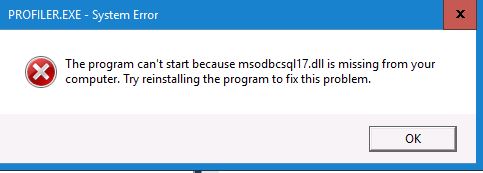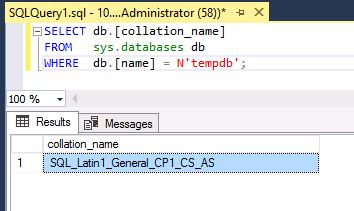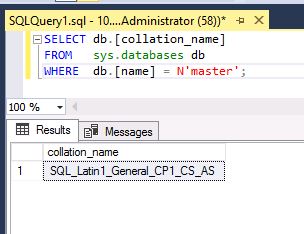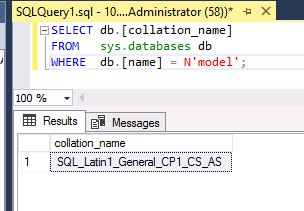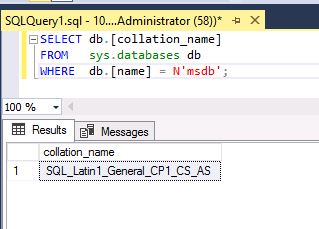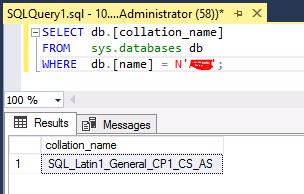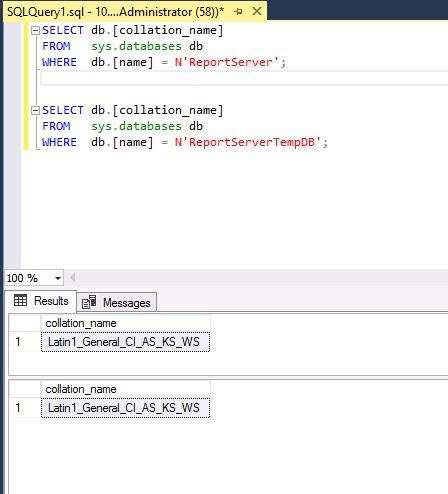I am unable to update the Original post below are the executed scripts
---- LIST ALL THE COLLATION OF TABLES
USE UserDB
GO
SELECT s.name as 'Schema_Name', t.name as Table_Name,
c.name AS Column_Name,
c.collation_name AS Collation
FROM sys.schemas s
INNER JOIN sys.tables t
ON t.schema_id = s.schema_id
INNER JOIN sys.columns c
ON c.object_id = t.object_id
WHERE collation_name is not null
ORDER BY Column_Name
---CHANGE COLLATION WILL CHANGE THE MAXIUM COLLATION SOME REMAIN SO FIX MANUAL BY NEXT METHOD
CREATE PROCEDURE CHANGE_COLLATION
AS
BEGIN
DECLARE @collate nvarchar(100);
declare @schema nvarchar(255);
DECLARE @table nvarchar(255);
DECLARE @column_name nvarchar(255);
DECLARE @column_id int;
DECLARE @data_type nvarchar(255);
DECLARE @max_length varchar(100);
DECLARE @row_id int;
DECLARE @sql nvarchar(max);
DECLARE @sql_column nvarchar(max);
SET @collate = 'SQL_Latin1_General_CP1_CS_AS';
DECLARE tbl_cursor CURSOR FOR SELECT (s.[name])schemaName, (o.[name])[tableName]
FROM sysobjects sy
INNER JOIN sys.objects o on o.name = sy.name
INNER JOIN sys.schemas s ON o.schema_id = s.schema_id
WHERE OBJECTPROPERTY(sy.id, N'IsUserTable') = 1
OPEN tbl_cursor FETCH NEXT FROM tbl_cursor INTO @schema,@table
WHILE @@FETCH_STATUS = 0
BEGIN
DECLARE tbl_cursor_changed CURSOR FOR
SELECT ROW_NUMBER() OVER (ORDER BY c.column_id) AS row_id
, c.name column_name
, t.Name data_type
, c.max_length
, c.column_id
FROM sys.columns c
JOIN sys.types t ON c.system_type_id = t.system_type_id
LEFT OUTER JOIN sys.index_columns ic ON ic.object_id = c.object_id AND ic.column_id = c.column_id
LEFT OUTER JOIN sys.indexes i ON ic.object_id = i.object_id AND ic.index_id = i.index_id
WHERE c.object_id like OBJECT_ID(@schema+'.'+@table)
ORDER BY c.column_id
OPEN tbl_cursor_changed
FETCH NEXT FROM tbl_cursor_changed
INTO @row_id, @column_name, @data_type, @max_length, @column_id
WHILE @@FETCH_STATUS = 0
BEGIN
IF (@max_length = -1) SET @max_length = 'MAX';
IF (@data_type LIKE '%char%')
BEGIN TRY
SET @sql = 'ALTER TABLE ' +@schema+'.'+ @table + ' ALTER COLUMN ' + @column_name + ' ' + @data_type + '(' + CAST(@max_length AS nvarchar(100)) + ') COLLATE ' + @collate
print @sql
EXEC sp_executesql @sql
END TRY
BEGIN CATCH
PRINT 'ERROR:'
PRINT @sql
END CATCH
FETCH NEXT FROM tbl_cursor_changed
INTO @row_id, @column_name, @data_type, @max_length, @column_id
END
CLOSE tbl_cursor_changed
DEALLOCATE tbl_cursor_changed
FETCH NEXT FROM tbl_cursor
INTO @schema, @table
END
CLOSE tbl_cursor
DEALLOCATE tbl_cursor
PRINT 'Collation For All Tables Done!'
END
EXEC CHANGE_COLLATION
---Some collation does not changed due to contraint so i already changed by using Alter statement
checking more which collation of the column other then the default collation
--- MAKE A SCRIPT TO ALL THE TABLES COLUMNS WHICH SHOWS THE NOT IN 'SQL_Latin1_General_CP1_CS_AS' COLLATION
CREATE procedure test2
as
DECLARE @collate SYSNAME
SELECT @collate = 'SQL_Latin1_General_CP1_CS_AS'
SELECT
'[' + SCHEMA_NAME(o.[schema_id]) + '].[' + o.name + '] -> ' + c.name
, 'ALTER TABLE [' + SCHEMA_NAME(o.[schema_id]) + '].[' + o.name + ']
ALTER COLUMN [' + c.name + '] ' +
UPPER(t.name) +
CASE WHEN t.name NOT IN ('ntext', 'text')
THEN '(' +
CASE
WHEN t.name IN ('nchar', 'nvarchar') AND c.max_length != -1
THEN CAST(c.max_length / 2 AS VARCHAR(10))
WHEN t.name IN ('char', 'varchar') AND c.max_length != -1
THEN CAST(c.max_length AS VARCHAR(10))
WHEN t.name IN ('nchar', 'nvarchar', 'char', 'varchar') AND c.max_length = -1
THEN 'MAX'
ELSE CAST(c.max_length AS VARCHAR(10))
END + ')'
ELSE ''
END + ' COLLATE ' + @collate +
CASE WHEN c.is_nullable = 1
THEN ' NULL'
ELSE ' NOT NULL'
END
FROM sys.columns c WITH(NOLOCK)
JOIN sys.objects o WITH(NOLOCK) ON c.[object_id] = o.[object_id]
JOIN sys.types t WITH(NOLOCK) ON c.system_type_id = t.system_type_id AND c.user_type_id = t.user_type_id
WHERE t.name IN ('char', 'varchar', 'text', 'nvarchar', 'ntext', 'nchar')
AND c.collation_name != @collate
AND o.[type] = 'U'
exec test2
Manual collation change by Alter command
ALTER TABLE [dbo].[RESULTS]
DROP CONSTRAINT [CONSTRAINT_RESULTS]
GO
ALTER TABLE [dbo].[RESULTS] ALTER COLUMN [Column_1] VARCHAR(10) COLLATE SQL_Latin1_General_CP1_CS_AS NOT NULL
GO
ALTER TABLE [dbo].[RESULTS] ADD CONSTRAINT [CONSTRAINT_RESULTS] PRIMARY KEY CLUSTERED
(
[Column_1] ASC,
)WITH (PAD_INDEX = OFF, STATISTICS_NORECOMPUTE = OFF, SORT_IN_TEMPDB = OFF, IGNORE_DUP_KEY = OFF, ONLINE = OFF, ALLOW_ROW_LOCKS = ON, ALLOW_PAGE_LOCKS = ON) ON [PRIMARY]
GO
